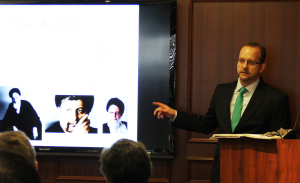
Andrew Scott Cooper, a specialist in U.S.-Iran relations at the Middle East Institute, spoke about the history of the relationship between the United States and Iran and the two countries’ views of each other in an event Thursday evening.
Andrew Scott Cooper, a specialist in U.S.-Iran relations at the Middle East Institute, spoke about the troubled relationship between the two countries in an event co-sponsored by the Center for Australian, New Zealand and Pacific Studies and the Center for Security Studies Thursday.
Cooper, who has previously worked in the United Nations and the Human Rights Watch and is currently a columnist for PBS/Frontline’s Tehran Bureau, discussed the role of the United States in the Iranian revolution.
“The revolution might be over inside the country,” Cooper said. “But as far as historians are concerned, the revolution has just started. We have now 35 years out of the revolution, Carter administration documents have just started to come out in the last 12 months and this is going to be a very rich time for people such as myself, who are wanting to go back and look at the U.S response inside Iran and how this affected repercussions and relations today.”
In terms of Iranian sentiment toward the United States, Cooper reminded the audience about the events which occurred during World War II.
“When we talk about the U.S. and Iran going to war, it is important to keep in mind that the U.S. invaded Iran and occupied it in 1943,” Cooper said. “Given that they have done that, the Iranians will say that they sent tanks during World War II, together with the British and the Russians. People haven’t forgotten that, they have memories of the occupation by the great powers.”
Cooper also talked about his specific perspective as a historian who researches topics that are most commonly debated by political scientists.
“Why am I here? Why am I not a political scientist? We historians have, I think, a really important role because we are neutral, we are coming at this from decades down the line, we are going back, we are trying to perform a critical evaluation of any surviving principles,” Cooper said. “What I try to do is build a picture of what is going and it is a very exciting frontier of research for to me involved, looking at this poisoned relationship, as I’ve defined it myself.”
Cooper said that U.S. citizens should look at Iran now with a more modern point view instead of being caught up on past events.
“When I read The Washington Post, The New York Times, I’m so discouraged,” Cooper said. “I’m so discouraged to see that people are still living in the world of 1979. This needs to change and I hope that I’m one of the new generations of younger scholars that will help make that change happen.”
Madeline Westrick (SFS ’18) said she was was intrigued by Cooper’s perspective on so many pivotal details that shaped U.S.-Iran relations into what they are today.
“I think that the talk given by Dr. Cooper really stands out from everything that I have ever read before on Iran. I really appreciated how he did not focus on the issue of nuclear weapons, which I feel is always the main focus when it comes to Iran,” Westrick said. “His focus on historical facts gave me a much more in- depth understanding of how things came to what they are. It was very interesting to see a talk by a historian instead of the usual political scientist. I think that was very refreshing.”
Marcela Gelhoren (MSB ’18) said she was also captivated by the talk because of her interest in international politics.
“Cooper’s historical background taught me a lot about Iran and made me greatly appreciate the importance of looking at the past in order to understand the present and even prospects for the future,” Gelhoren said.”I really liked how he emphasized areas which scholars usually choose not to, but which are extremely important in order to understand the full picture.”














